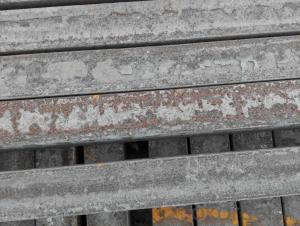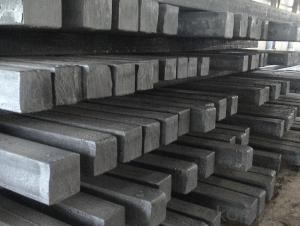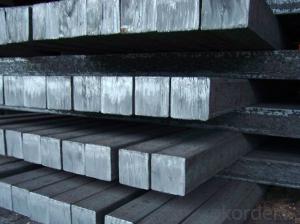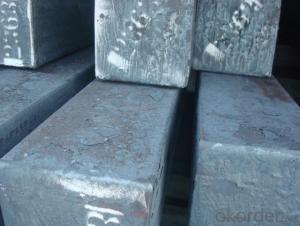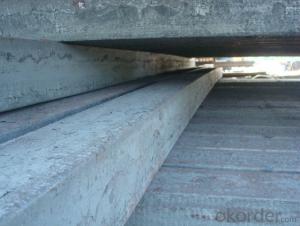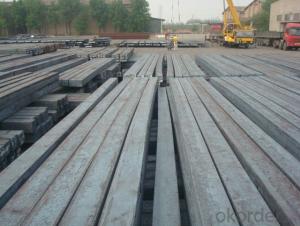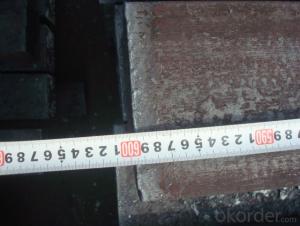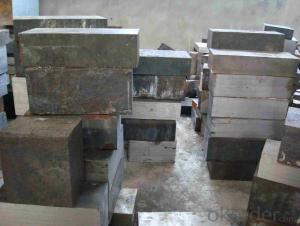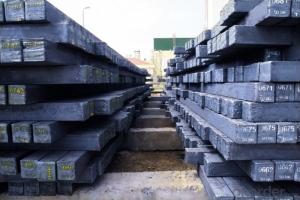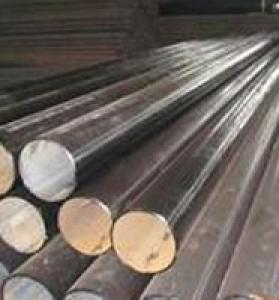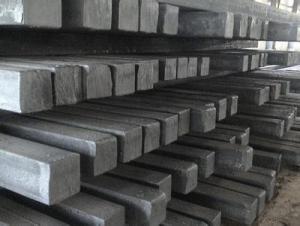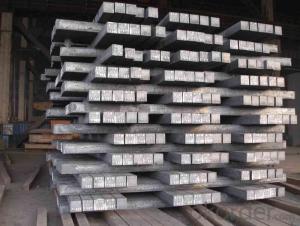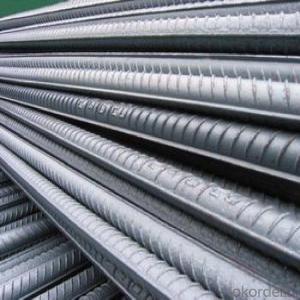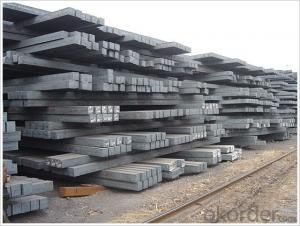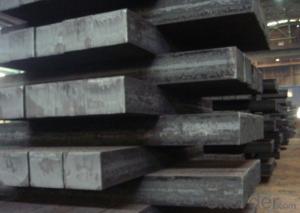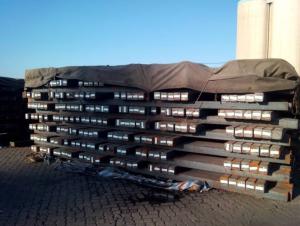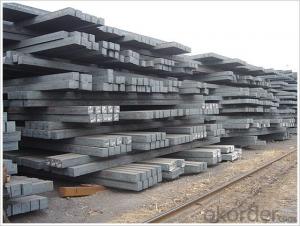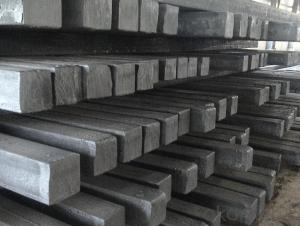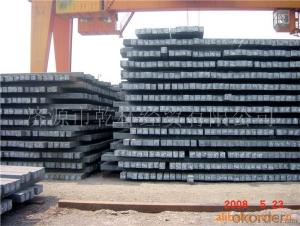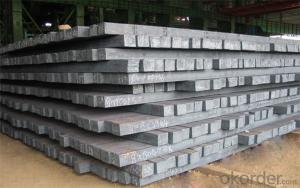Carbon Square Billets Q275/3SP in China for Construction
- Loading Port:
- China main port
- Payment Terms:
- TT OR LC
- Min Order Qty:
- 50 m.t.
- Supply Capability:
- 100000 m.t./month
OKorder Service Pledge
OKorder Financial Service
You Might Also Like
Description of Carbon Square Billets Q275/3SP in China for Construction
We procure world class quality steel billets which meets the specific requirements of the clients
The Billets produced by the company can be broadly divided into three main types i.e.
Festures of Carbon Square Billets Q275/3SP in China for Construction
Billets are used for rolling of TMT Re-Bars of Fe415 and Fe500 Grade and various other structural steel products. Billets are used fro rolling of CRS TMT Re-Bars..
Product Size of Carbon Square Billets Q275/3SP in China for Construction
| GRADE | SIZE | APPLICATION |
Q195/ 215 | 100mm*100mm*6m | REBAR |
| 120mm*120mm*6m | ||
| 130mm*130mm*6m/12m | ||
| 150mm*150mm*6m/12m |
Chemical Compositon of Carbon Square Billets Q275/3SP in China for Construction
Q195/ 215 | C (%) | Si (%) | Mn (%) | P(%) | S(%) |
| 0.06-0.12 | 0.15-0.30 | 0.35-0.50 | 0.045% Max | 0.045Max |
Technology process of Carbon Square Billets Q275/3SP in China for Construction
1.Heat the EVA film
2.Cover the heated EVA film on the mould(can be made from wood or aluminum)
3.Spray a coating in a certain baume degree
4.Put on the empty blask
5.Sand-up the flask and vibrate to compaction
Packaging & Delivery of Carbon Square Billets Q275/3SP in China for Construction
Packaging Details:containers
Delivery Detail:Complete one set of equipment needs for three months
The products can be delivered by bulk vessel or by container. As for container, products with the length of 6m will be loaded in 20’ container, with 9m or 12m, in 40’ container.
-The maximum quantity of loading of container is 25 tons.
-The products usually are transported to the nearest port from the production place.
Products Show
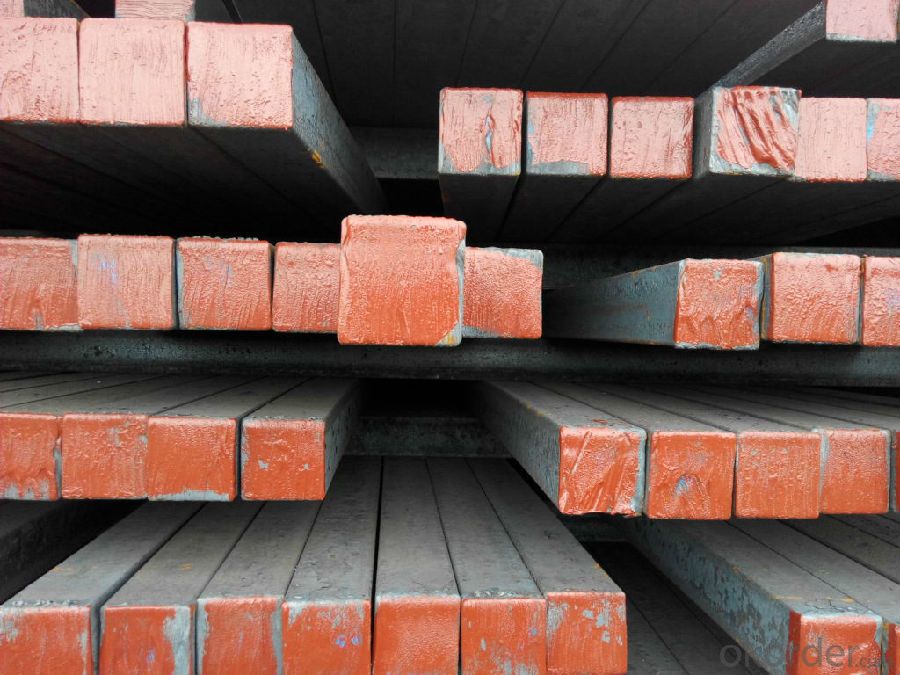
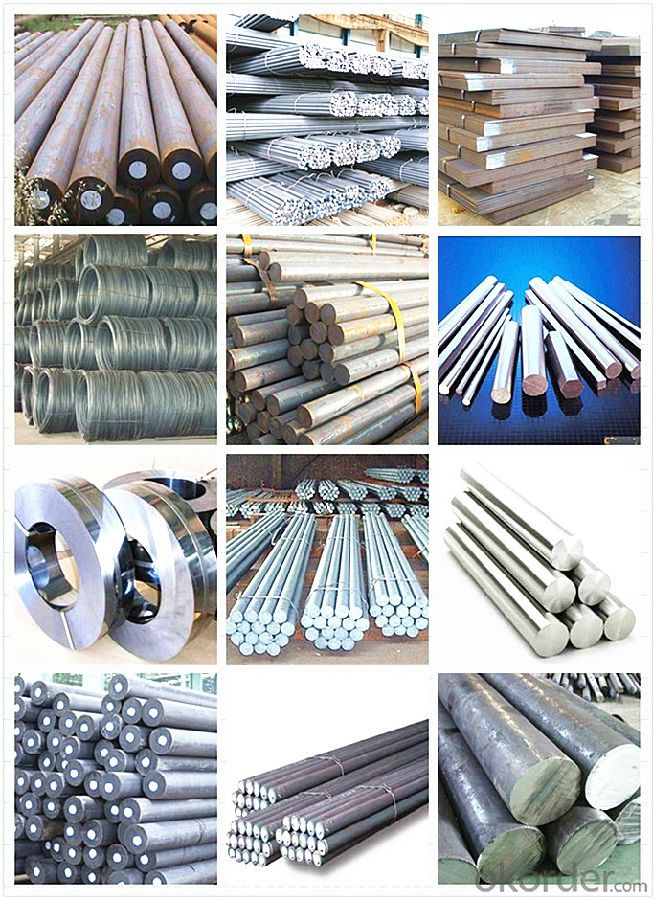
FAQ:
1.Your advantages?
Professional products inquiry, products knowledge train (for agents), smooth goods delivery, excellent
customer solution proposale
2. Test & Certificate?
SGS test is available, customer inspection before shipping is welcome, third party inspection is no problem
3. Factory or Trading Company?
CNBM is a trading company but we have so many protocol factories and CNBM works as a trading department
of these factories. Also CNBM is the holding company of many factories.
4. Payment Terms?
30% TT as deposit and 70% before delivery.
Irrevocable L/C at sight.
5. Trading Terms?
EXW, FOB, CIF, FFR, CNF
6. After-sale Service?
CNBM provides the services and support you need for every step of our cooperation. We're the business
partner you can trust.
For any problem, please kindly contact us at any your convenient time.
We'll reply you in our first priority within 24 hours.
- Q:What are the typical dimensions and weight of steel billets?
- The typical dimensions of steel billets can vary depending on their intended use and production process. However, common dimensions range from 100mm to 200mm in width and height, with lengths typically ranging from 3 to 12 meters. As for weight, steel billets can weigh anywhere from a few hundred kilograms to several metric tons, depending on their size and density.
- Q:What are the specifications for tool steel billets used in the automotive industry?
- Tool steel billets used in the automotive industry typically have specific specifications to ensure their suitability for various applications. These specifications are crucial to ensure the desired performance and durability of the tool steel in automotive manufacturing processes. One important specification for tool steel billets used in the automotive industry is the chemical composition. The tool steel must have a specific composition of elements such as carbon, chromium, vanadium, and molybdenum, among others. These elements contribute to the steel's hardness, wear resistance, and toughness, which are essential properties for automotive tooling. Additionally, the tool steel billets must possess a specific hardness range. Hardness is measured using various scales such as Rockwell or Brinell, and the desired hardness depends on the intended application. Higher hardness is generally preferred for tools that require high wear resistance, while lower hardness may be suitable for tools that require toughness and impact resistance. Furthermore, the tool steel billets used in the automotive industry must have excellent dimensional stability. This means that the steel should have minimal dimensional changes during heat treatment and manufacturing processes, ensuring the tools maintain their shape and accuracy over time. Another important specification is the machinability of the tool steel. It should be easy to machine and shape into the desired tooling components without excessive tool wear or difficulty. Good machinability allows for efficient production and reduces costs associated with tooling. The tool steel billets used in the automotive industry should also have good thermal conductivity. This property allows the heat generated during manufacturing processes, such as forging or heat treatment, to be effectively dissipated. Good thermal conductivity helps prevent localized overheating and ensures uniform heat distribution throughout the tool, resulting in consistent performance. Lastly, the tool steel billets should be free from defects and impurities. These include cracks, voids, inclusions, or any other imperfections that can compromise the integrity and performance of the tool steel. Quality control measures, such as non-destructive testing, are typically implemented to ensure the billets meet the required standards. In summary, the specifications for tool steel billets used in the automotive industry encompass factors such as chemical composition, hardness, dimensional stability, machinability, thermal conductivity, and overall quality. These specifications ensure that the tool steel meets the specific requirements of automotive tooling applications, providing durability, performance, and reliability in automotive manufacturing processes.
- Q:Are steel billets used in the production of household goods?
- No, steel billets are not typically used in the production of household goods. Steel billets are semi-finished products that are used as raw material for various industries, such as construction, automotive, and manufacturing. They are usually hot-rolled into different shapes, such as bars, rods, or sheets, which are then further processed to create the desired household goods. For household goods, manufacturers often use specific types of steel, such as stainless steel or carbon steel, that have been processed and shaped according to the particular product requirements.
- Q:What are the different types of steel billet inspection equipment?
- There are several types of steel billet inspection equipment, including ultrasonic testing machines, magnetic particle inspection systems, eddy current testing devices, and visual inspection tools. These equipment are used to ensure the quality and integrity of steel billets by detecting any defects or irregularities in their composition, surface, or internal structure.
- Q:What are the advantages of using steel billets in the manufacturing process?
- Using steel billets in the manufacturing process offers numerous benefits. Firstly, the controlled casting process used to produce steel billets ensures superior quality and consistent material. This consistency is essential in manufacturing applications that demand precise dimensions and mechanical properties. Secondly, steel billets possess remarkable strength and durability, making them suitable for a wide range of manufacturing purposes. Steel is renowned for its high tensile strength, enabling it to withstand heavy loads and impacts without any deformation or failure. As a result, steel billets are ideal for structural components and machinery parts that must endure high levels of stress. Moreover, steel billets can be easily shaped and formed into various sizes and shapes to meet specific design requirements. Manufacturers can achieve the desired shape by hot rolling, cold rolling, or forging the billets. This flexibility allows for the creation of intricate and complex parts with ease. Additionally, steel billets have exceptional resistance to heat and corrosion. This makes them highly suitable for applications involving high temperatures or exposure to harsh environments, such as automotive components, construction materials, and industrial machinery. Furthermore, steel billets are readily available and cost-effective compared to alternative materials. Steel is one of the most widely produced and recycled materials globally, ensuring a consistent supply and competitive prices. This availability and affordability make steel billets the preferred choice for many manufacturers. Lastly, steel billets are environmentally friendly. The recyclability of steel helps reduce energy consumption and greenhouse gas emissions during the manufacturing process. Choosing steel billets enables businesses to minimize their environmental impact and make sustainable choices. In conclusion, the advantages of using steel billets in the manufacturing process include their superior quality and consistency, exceptional strength and durability, versatility in shaping, resistance to heat and corrosion, availability and cost-effectiveness, and environmental sustainability.
- Q:What are the properties of high-quality steel billets?
- High-quality steel billets are sought after for their desirable properties in various applications. Chiefly, these billets boast a high degree of purity, containing minimal impurities like sulfur, phosphorus, and other non-metallic elements. This purity contributes to the overall strength and performance of the steel. Another crucial property of high-quality steel billets is their uniform internal structure. This means that the grains within the billet are evenly distributed, resulting in consistent mechanical properties throughout the material. This uniformity enhances the steel's strength, toughness, and durability. High-quality steel billets also demonstrate excellent dimensional accuracy. They possess precise and consistent dimensions, which are vital for subsequent processing and manufacturing operations. This dimensional accuracy ensures that the billets can be easily formed, rolled, forged, or machined into their intended final shapes. Moreover, high-quality steel billets exhibit a superior surface finish. They are devoid of defects like cracks, voids, or inclusions on their surfaces. This smooth and defect-free surface allows for better heat transfer, improved corrosion resistance, and an enhanced aesthetic appearance of the final steel products. Lastly, high-quality steel billets showcase excellent metallurgical properties. They possess a well-controlled chemical composition, which determines their specific mechanical and physical characteristics. These properties can be tailored to meet the requirements of different applications, such as high strength, high ductility, or resistance to extreme temperatures. To summarize, high-quality steel billets possess properties such as purity, uniform internal structure, dimensional accuracy, excellent surface finish, and desirable metallurgical properties. These properties make them ideal for a wide range of applications, including the construction, automotive, aerospace, and manufacturing industries.
- Q:What is the active carbon. What is the difference with the charcoal?
- This decision of the activated carbon has Good adsorption of metal ions, adsorption, wastewater and waste gas in the harmful gases, organic pollutants, such as pigment. Application of activated carbon also requires high mechanical strength, good abrasion resistance, its structure to stabilize, adsorption energy required, to facilitate the regeneration. The active carbon used for oil, beverage, food, drinking water, decolorization, deodorization, gas separation, solvent recovery and air conditioning, adsorbent is used as a catalyst carrier and a gas mask. Charcoal is made from trees and dry, is a kind of fuel. Soil general burn charcoal, is placed in a kiln inner wood, after the ignition, when he arrived a certain temperature, closed kiln inlet, let the heat get distillation of wood and charcoal. To serve the people of Zhang Side is burning charcoal, charcoal kiln collapsed when.1 died
- Q:What are the potential applications of steel billets in the chemical aftermarket?
- Steel billets have a wide range of potential applications in the chemical aftermarket. One of the key uses of steel billets is in the production of various chemical processing equipment. These billets can be used to manufacture reactors, heat exchangers, columns, and other critical components that are used in chemical plants. Furthermore, steel billets are also utilized in the construction of storage tanks for storing chemicals. These tanks need to be strong, durable, and resistant to corrosion, and steel billets provide the necessary properties to meet these requirements. In addition, steel billets find applications in the fabrication of pipelines and piping systems used for transporting chemicals. The high strength and resistance to temperature and pressure make steel billets an ideal choice for constructing pipelines that can handle corrosive and hazardous chemicals. Moreover, steel billets can be shaped and formed into various fittings and flanges that are essential components in chemical systems. These fittings and flanges are used to connect different sections of piping, valves, and other equipment, ensuring a secure and leak-free operation. Overall, the potential applications of steel billets in the chemical aftermarket are vast and diverse. From manufacturing chemical processing equipment to constructing storage tanks, pipelines, and fittings, steel billets play a crucial role in ensuring the safe and efficient operation of chemical facilities.
- Q:What are the common grades of steel used for billets?
- The common grades of steel used for billets vary depending on the intended application and specific requirements. However, some of the most commonly used grades include: 1. Carbon Steel: Carbon steel billets are widely used due to their high strength, durability, and affordability. Grades such as AISI 1018, 1020, 1045, and 1060 are commonly used for general-purpose applications. 2. Alloy Steel: Alloy steel billets are blended with specific alloying elements to enhance their mechanical properties such as strength, toughness, and corrosion resistance. Grades like AISI 4140, 4340, and 8620 are commonly used for applications requiring higher strength, heat resistance, or wear resistance. 3. Stainless Steel: Stainless steel billets are chosen for their excellent corrosion resistance and aesthetic appeal. Grades such as 304, 316, and 420 are commonly used for various applications, including construction, automotive, and food processing industries. 4. Tool Steel: Tool steel billets are specifically designed to have high hardness, wear resistance, and toughness. Grades such as AISI O1, D2, and A2 are commonly used for manufacturing cutting tools, dies, and molds. It is important to note that the selection of the appropriate grade of steel depends on the specific requirements of the application, such as mechanical properties, corrosion resistance, and temperature resistance. Consulting with a metallurgist or an expert in the field can help determine the most suitable grade of steel for billet production.
- Q:How are steel billets used in the construction industry?
- Steel billets are a crucial component in the construction industry, used in a variety of ways to support and enhance the structural integrity of buildings and infrastructure. These billets, which are essentially semi-finished steel products, are first heated and then shaped into specific forms to meet the desired requirements of construction projects. One of the primary applications of steel billets is in the production of reinforcing bars, commonly known as rebar. Rebar is used to provide strength and stability to concrete structures, such as buildings, bridges, and highways. Steel billets are heated and rolled into long, cylindrical shapes to create these reinforcement bars. Once embedded within the concrete, rebar enhances its tensile strength, preventing cracks and structural failure. Steel billets are also used in the manufacturing of structural steel sections, such as beams, columns, and channels. These sections are vital for constructing the skeleton of a building, providing support and load-bearing capacity. Steel billets are heated and rolled into various shapes and sizes, depending on the specific requirements of the project. These structural steel sections are then assembled to create the framework of the building, ensuring its stability and durability. In addition to rebar and structural steel sections, steel billets are utilized in the production of various other construction components. These include steel plates, pipes, tubes, and wires, which are used for different purposes within the construction industry. For instance, steel plates are used to reinforce the foundations of buildings, while steel pipes and tubes are used for plumbing, drainage, and HVAC systems. Steel wires are commonly used to strengthen concrete structures and as reinforcement in precast concrete elements. Overall, steel billets play a crucial role in the construction industry by providing the necessary raw material for the production of reinforcing bars, structural steel sections, and other construction components. Their versatility and strength make them an essential ingredient in ensuring the safety, stability, and longevity of buildings and infrastructure projects.
1. Manufacturer Overview |
|
|---|---|
| Location | |
| Year Established | |
| Annual Output Value | |
| Main Markets | |
| Company Certifications | |
2. Manufacturer Certificates |
|
|---|---|
| a) Certification Name | |
| Range | |
| Reference | |
| Validity Period | |
3. Manufacturer Capability |
|
|---|---|
| a)Trade Capacity | |
| Nearest Port | |
| Export Percentage | |
| No.of Employees in Trade Department | |
| Language Spoken: | |
| b)Factory Information | |
| Factory Size: | |
| No. of Production Lines | |
| Contract Manufacturing | |
| Product Price Range | |
Send your message to us
Carbon Square Billets Q275/3SP in China for Construction
- Loading Port:
- China main port
- Payment Terms:
- TT OR LC
- Min Order Qty:
- 50 m.t.
- Supply Capability:
- 100000 m.t./month
OKorder Service Pledge
OKorder Financial Service
Similar products
New products
Hot products
Related keywords
